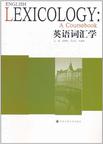英语词汇学
出版时间:2011-8 出版社:华东师范大学出版社 作者:汪榕培,王之江,朱越峰 页数:318
Tag标签:无
内容概要
汪榕培、王之江、朱越峰主编的《英语词汇学》可供英语专业学生和其他外语学习者使用和参考。
《英语词汇学》涵盖了英语词汇的发展、构词法、词义、语块、语境、词典等方面,角度多元,内容丰富,展现了全新的当代英语词汇学视野。同时作者力求体现多学科知识的交叉融合,反映了英语词汇学研究的最新思路和动态。全书既着重词汇学理论的阐释,又突出词汇学的实践应用。
书籍目录
Chapter 1 English Words and Lexicology -- Basic Concepts
1.1 Understanding Words
1.2 Understanding Lexicology
1.3 An Introduction to Works of Lexicology
Chapter 2 The Growth of the English Vocabulary (1) -- Sources
2.1 The Language Family of English
2.2 From Old English to Modern English
2.3 The Origins of English Words
Chapter 3 The Growth of the English Vocabulary (2) -- British
& American
3.1 World Englishes
3.2 British English
3.3 American English
3.4 The Future of English
Chapter 4 The Growth of the English Vocabulary (3) -- New Words
4.1 Neologisms
4.2 The Study of New Words
4.3 Reasons of the Gr6wth
4.4 Sources for New Words
Chapter 5 The Formation of English Words (1) -- Major Types
5.1 Notions of Morphological Formation
5.2 DerivatiOn
5.3 Conversion
5.4 Compounding
Chapter 6 The Formation of English Words (2) -- Minor Types
6.1 Abbreviation
6.2 Back-formation
6.3 Onomatopoeia
6.4 Reduplication
Chapter 7 The Meanings of English Words (1) -- Aspects of Meaning;
Change of Meaning
7.1 Aspects of Meaning
7.2 Change of Meaning
7.3 Mechanisms for Meaning Change
Chapter 8 The Meanings of English Words (2) -- Sense Relations
8.1 Synonymy
8.2 Antonymy
8.3 Polysemy
8.4 Homonymy
8.5 Hierarchical Relations
Chapter 9 Lexical Chunks (1) -- Collocations
9.1 Lexical Chunking
9.2 Definition of Collocation
9.3 The Features of Collocation
9.4 Characteristics, Classifications and Categories of
Collocations
9.5 Basic Types of Collocations
9.6 The Significance of Learning Collocations
Chapter 10 Lexical Chunks (2) -- Idioms
10.1 Definition of Idiom
10.2 Classifications of Idioms
10.3 Figurative Idioms
Chapter 11 The Use of English Words (1) -- Words in Context
11.1 Words and Their Meanings in Use
11.2 The Meanings of Words: "Mean" and "Meaning"
11.3 Lexical Semantics
11.4 Lexical Semantics and Lexical Pragmatics
11.5 Lexical Meaning and the Context
11.6 Meanings of English Words in Lexical Pragmatics
Chapter 12 The Use of English Words (2) -- Metaphor, Metonymy,
etc.
12.1 An Introduction to Figures of Speech: the Figurative Uses
of Words
12.2 English Words in Metaphor
12.3 English Words in Metonymy
12.4 Other Figurative Uses of English Words
Chapter 13 The Dictionaries of English Words (1) -- Types of
Dictionaries
13.1 The Development of Dictionaries
13.2 The Contents of Dictionaries
13.3 The Types of Dictionaries
Chapter 14 The Dictionaries of English Words (2) -- How to Use
Dictionaries
14.1 How to Use Dictionaries
14.2 Corpus and Lexicography
14.3 Electronic Dictionaries
Chapter 15 The Learning of English Words (1) -- The Mental Lexicon
15.1 Memory in the Language-Processing System
15.2 The Mental Lexicon and Its Organization
15.3 Variables Influencing Lexical Access
Chapter 16 The Learning of English Words (2) -- Learning
Strategies and Tactics
16.1 The Vocabulary Size
16.2 Vocabulary Acquisition
16.3 Vocabulary Learning Strategies
References
Links and Resources
Key
章节摘录
In the long run, perhaps the most promising development of computer use is on-line editing of dictionaries, as of other kinds of data. On-line means "having direct access to the computer file", usually by means of a video screen with an attached keyboard. Although on-line editing has been and is being employed in some dictionary projects, it is still not widely used, which is why discussion of it has been delayed until now.In on-line editing, the editor can summon to the display unit any identified element of the current file in order to see it, change it, transfer it to another part of the file, or delete it. The great advantage of on-line editing is the immediate availability of the very latest file data. In ordinary editing, no one editor can know what other editors have done to other parts of the file without s me delay —— often a long one —— and without laborious checking of card files or manuscript. Without knowing what is in the file, the editor may make mistakes or duplicate work already done. On-line editing makes style checking easier and has many other advantages.Up until very recently, however, attempts to prepare dictionaries on-line have been plagued with difficulties and have seldom materialized on a large scale. The Dictionary of American Regional English,for example,which as we have seen uses computers extensively,was originally planned to have been written and edited on-line, but it was found to be easier to write it conventionally, while using information produced by computer on video screens. In the United States, the Random House Dictionary was one of the first major commercial dictionaries to utilize computers to store and categorize word lists, but the dictionary was not written or edited on-line.Neither was the American Heritage Dictionary, which used computers even more extensively to help produce its citation files. A scholarly historical work, the Dictionary of Old English, is,however, being edited on-line at the University of Toronto. ......
图书封面
图书标签Tags
无
评论、评分、阅读与下载
用户评论 (总计13条)
- 书真的很好 快递员服务也很好 。。。是我自己要定汉语版的 定错了定成英语版了 。。
- 全英文的,个人觉得不错,内容很丰富
- 看着目录买的还以为是中文的呢。。内容好多啊,值得慢慢看了,还带有习题,应该不错
- 前中后英不错
- 速度。书正版
- 很不错,价格相对来说比较便宜,纸质还算可以
- 全英的,看起来有点吃力,但总体不错
- 很开心,能与汉语版的英语词汇学配套使用
- 内容不错,还是中文的好看
- 是我们的教科书,比学校里买的便宜很多。有了这本书,上课应该会很有用!
- 因为老师上课用这本书作教材,然后就赶紧在网上寻找可购书的书城。最后还是下手慢了,本来是很信任**亚马逊的,一直都在他那买书。可是竟然发现这本书在他那竟然是授权给其他书店来买的,有被伤到。一直喜欢网上购书的原因就是可以货到付款,但是**那样做实在让人不高兴。后来在当当上看到这本书,书本剩下没几本(没有显示还剩多少本书,我觉得以后最好有这样的显示,要不然就会造成我之后的乌龙)然后就赶紧下手了。本来还想连着购买的3本,可是发现连着购买无法送到桂林。天啊,这是在太怪异了!后来就减为1本,还是无法送到桂林。显示为区域购买,难道真的不能买到?然后我又去豆瓣上搜索这本书,查找潜在的购书点,看到仅有**和当当有这本书买,心都凉了半截。抱着试一试的心态,我通过豆瓣的链接,竟然将书买成了,能配送到桂林,实在是太怪异了!这样的经验,我实在是不想再试一次了。。。。
- 内容还行,就是书有些旧了
- 这个是全英的,大家看好再买
